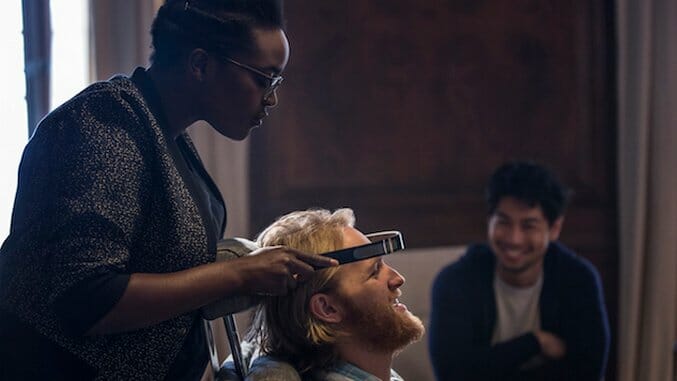Black Mirror‘s “Playtest” and the Hidden Horrors of the Mind
(Episode 3.02)
Laurie Sparham/Netflix
For the last few months I have been having this recurring dream. It’s not exactly a nightmare; when I explain it out loud, it’s almost comical. In this dream, I’m always in a car—or, even worse, a bus—and we’re driving up this unrealistically steep mountain road with a cliff to one side and an infinite drop literally inches from where the vehicle’s tires are struggling up the bumpy tarmac. I’m never driving; I’m at the mercy of someone else’s driving skills and I just know that, once we get to the top, we’ll either topple over backwards or drop down the abyss to our left. Nothing really happens as we’re struggling up this road, but the anxiety I experience along the way feels unbounded.
After the third night of waking up in a full sweat, it was like: Ok, I get it. I know what you’re trying to tell me, I get what fears you’re pushing me to confront. Freud, Jung et al. would be very proud. Bravo. While I find it fascinating that my brain is so adamant in letting me know I still have lots of hours of meditation ahead before I can let go of my fears, I’m a bit tired of it disturbing my treasured trips to dreamland and the first few hours of my waking life. But after having watched Black Mirror’s “Playtest,” I realize how much worse it could be. I’m complaining about a mental kick in the ass, courtesy of my brain, not a psychological freak show sent to me from the depths of my soul. If that were the case, I would wake up every morning weeping for it to stop.
For centuries, people have been chasing this very experience, this confrontation with the darkest corners of our subconscious through hypnosis, hallucinogens, and the analysis of dreams. Those who do so wisely know that these experiences should occur in a controlled environment, under the guidance of someone familiar with the rituals and procedures. Most importantly, this kind of self-discovery should be embarked on at the right time, and doing so while you’re still processing any serious personal trauma is definitely not it. Carlos Castaneda’s Don Juan made his “student” return to him time and time again before he deemed him ready to “play” with mescalito. And for very good reasons.
In “Playtest,” Charlie Brooker creates a new approach to self-discovery, in the form of a virtual reality game. The episode is a vehicle into the underworld of our deepest subconscious and, unlike the wise shaman in “The Teachings of Don Juan,” Brooker doesn’t give a shit whether you’re ready for this journey or not. In fact, he thrives on the vulnerability and unpreparedness of the episode’s protagonist, game tester Cooper (Wyatt Russell). This time, Brooker isn’t just out to remind us of the powers of technology. Oh, no. He’s rubbing our faces in the one thing we tend to fear the most: our very own minds.
Cooper comes across as your typical, goofy twenty-something guy, travelling the world for the first time. His motto seems to be, “The less time you spend fighting your fears, the more fun you will have embracing them.” But when an unexpected change in his financial situation forces him to take on an unusual job, we realize nothing could be further from the truth. He is put face to face with his inner demons as a tester for a virtual reality game designed by the world-renowned game developer Shou Saito (Ken Yamamura).
-

-

-

-

-

-

-

-

-

-

-

-

-

-

-

-

-

-

-

-

-

-

-

-

-

-

-

-

-

-

-

-

-

-

-

-

-

-

-

-








































